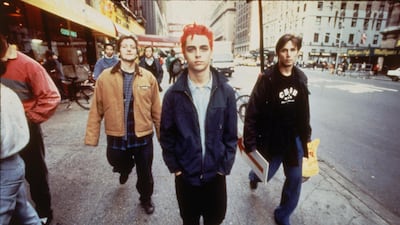Rock history is littered with unexpected developments. When The Beatles first emerged in the late 1950s, they were more concerned with recreating the energy and melodic ingenuity of heroes Chuck Berry and Elvis Presley. But in the process, they created something entirely unique, inspiring the pop songwriting book we follow today.
The Rolling Stones also had small aspirations at first; the group began as a way to jam their favourite blues covers, and in turn, they fashioned a new swaggering sound that laid the groundwork for what became modern rock.
The same can also be said for Nirvana – they initially envisioned themselves as punks when first emerging from Seattle in the mid-1980s. Their idiosyncratic approach to the genre – such as the heavier, textured guitars and singer Kurt Cobain’s introspective lyricism – resulted in the creation of a new rock subgenre, grunge.
It was on the tail of the grunge movement that California punk trio Green Day released their groundbreaking third album Dookie, which turns 30 this week. The 1994 release may not be in any "top 10 best rock records of all time" lists, but it is easily one of the most influential.
This bright and brash song collection about suburban boredom and apathy not only managed to transform an increasingly closed-minded US punk scene, but also created a sunny pop-punk sound that endures today.
The sound of change
While Green Day's story is often told as starting from the release of Dookie, which was their first album on a major label, the band had been performing and releasing music for nearly a decade before the studio release. In the run-up to its release, the California punk scene was in its heyday, and the epicentre was Berkley's 924 Gilman Street club. The sounds of the movement were defined by what it wasn't: not pop, not commercial and no major label support.
Green Day’s hard work ethic was honed, thanks in part, to the club’s DIY ethos, and their incendiary energy was born during the sweaty performances they gave in the small venue. But by 1993, the band were itching for change, and they welcomed the idea of joining major record label Reprise (which, at the time was home to the likes of Enya, Stevie Nicks and Neil Young). They did this because they wanted to make music a full-time gig.
The punks were outraged: Dookie not only resulted in an immediate ban for Green Day from performing at the club (to be rescinded later by members), but its zippy and accessible melodies resulted in the worst fate: the scene labelled them sellouts.
However, like most landmark albums, Dookie arrived at just the right moment. Some would even argue that it dropped in the nick of time, as the rock genre at that stage was positively humourless. It needed a Dookie. In 1994, Pearl Jam released their rollicking yet bleak Vitalogy, Bush kept the grunge flame alive with their sludgy debut Sixteen Stone and Nine Inch Nails were deathly dark with foreboding opus The Downward Spiral.
Words and melodies
Green Day arrived like pranksters at a wake. Dookie was fun and funny, as well as bloody-minded in its attempt to lodge songs in your brain. Tracks such as the seminal Basket Case, Longview and Welcome to Paradise, were not only hits due to slacker videos played in high rotation on MTV, but they also displayed a sharp songwriting nous. Unlike their peers, Green Day weren't afraid of melodies or making a song pretty, which is best exemplified in the pin-point harmonies of Pulling Teeth. And, when it came to humour, unlike perennial punk jokers NOFX, lead singer and chief writer Billie Joe Armstrong knew when to be funny and when not to be.
As one of rock's most underrated lyricists, he infused the rolling When I Come Around with subtle sarcasm, which ultimately acts as a foil to allow the song's hard truths to pierce through, such as at the end of the second verse when Armstrong reflects: "You can't go forcing something if it's just not right."
The same trick is repeated in the major hit Basket Case. It begins with a sneering Armstrong enquiring: "Do you have the time, to listen to me whine?" The guitars then crash through and the song transforms into a zany yet affecting ode to mental health. Over the jubilant buzzing riffs, Armstrong shares his documented struggles with anxiety and panic disorders, and in the process articulates the pent-up tension of many disaffected teenagers: "Sometimes I give myself the creeps / Sometimes my mind plays tricks on me / It all keeps adding up / I think I'm cracking up."
Opening up the punk scene
The public, and eventually the begrudging scene, truly responded to the album's charms. With more than 20 million albums sold, Dookie's success created an appetite for more upbeat rock and in the process, helped shift the US punk community away from its restrictive principles.
As a result, a slew of once-struggling punk bands embraced the opportunities afforded them and groups such as The Offspring, Blink-182, Good Charlotte and Sum 41 all commanded, and still do bring in, big audiences and sell an impressive number of albums. Despite their pedigree, the success would have been harder for these bands if Green Day had not charted them a course.
Thirty years on, the album and the band have yet to receive the credit they're due. Like their forebears, The Ramones and The Clash, Green Day played an important role in expanding the sound of punk. While they went on to more success with their politically charged 2004 album American Idiot, the reverberation of their masterpiece Dookie still resonates today.


